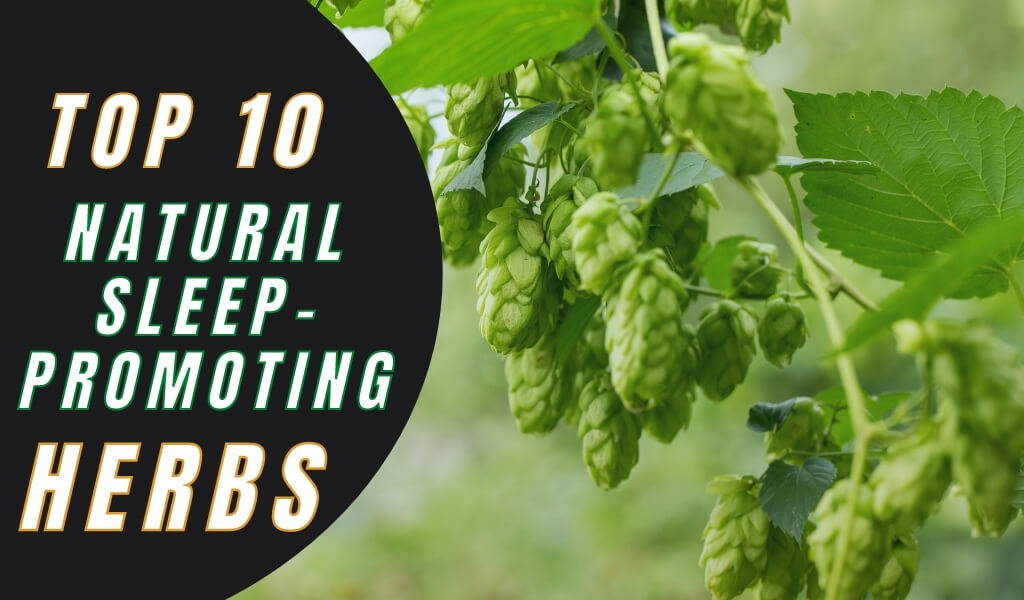Sleep is your body’s natural means of self-healing. A good night’s sleep sets you up for a productive day. To feel calm and rejuvenated, you need 7 to 9 hours of sleep. But finding quality sleep is difficult at times and the help of Natural Herbs is sought. Natural Sleep-Promoting Herbs are an ideal choice for you if you are one of the 1 in 3 adults who do not get a full night’s sleep.
Natural herbs have potent sleep-inducing powers, ensuring a restful night’s sleep. In addition, they help you relax by calming your muscles and soothing your senses. We shall analyze the various types of sleep-promoting herbs, how they help you sleep better, and how to use them in this article.

Why use Natural Herbs
Herbs help you sleep well by addressing some of the most common causes of sleep loss. A hectic lifestyle, anxiety, and stress are all common causes of sleep deprivation. The neurotransmitter, serotonin is affected by stress, but herbal supplements help compensate for this deficiency.
Tryptophan, an amino acid that aids in serotonin synthesis, is abundant in some natural herbs. Serotonin is a compound that facilitates the transmission of nerve impulses from one cell to the next. The serotonin levels balance out the chemical imbalance that causes insomnia, the most common sleep condition. Insomnia finds it impossible to fall asleep or remain asleep for more than seven to nine hours at a time.
Natural herbs aid in these situations. All of them help you fall asleep by lowering your anxiety or encouraging physiological changes like calming your muscles and slowing your heart rate helps you sleep better.
The herbs mentioned below help you relax, ease, and de-stress, resulting in a restful night’s sleep. But, first, we shall go into how each of these 10 natural herbs helps you get good sleep.
10 Natural Herbs for Good Night Sleep
1) LAVENDER

Lavender’s antidepressant, sedative, and calming properties aid in better sleep. Lavender herbs has shown to calm nerves and reduce anxiety in studies, and stabilize mood disorders. Reduced fatigue, anxiety, and a good mood encourage daytime alertness and more restful night-time sleep. Inhaling lavender-infused essential oils help to lessen the intensity of migraine pain. According to the analysis described above, this even aids migraine sufferers in getting a decent night’s sleep.
2) CHAMOMILE

Chamomile is a relaxing herb that is being used for centuries. Even modern scientific studies back up chamomile’s effectiveness. It calms your nerves, relieves anxiety, and helps you sleep better. Chamomile tea is a popular tranquillizer due to the presence of nerve-relaxing flavonoids. Even just inhaling the scent of chamomile has a calming effect.
3) VALERIAN

Valerian herb roots serve to treat patients with insomnia, restlessness, and anxiety. The degradation of GABA neurotransmitters is inhibited by valerian-root valerenic acid. And this improves sleep efficiency. In addition, Valerian focuses on anxiety-reducing qualities, encouraging deep sleep.
Valerian enhances the latency to sleep quickly. The latency is the amount of time it takes to fall asleep after you lie down on your bed and the lights go out.
4) PASSIONFLOWER

Passionflower has nerve-relaxing flavonoids that aid in stress relief and improved sleep. This tropical flower has a pleasant flavour and is widely used as a natural, over-the-counter sedative.
5) ASHWAGANDHA

Ashwagandha is a herb widely used to treat insomnia as studies have shown that it works well to improve sleep latency and rest efficiency. In the Ashwagandha leaves of this herb, the true sleep promotion compound —triethylene glycol is found that removes the tension or anxiety sensations, causes peace and helps you quickly fall asleep. Ashwagandha serves as a sedative, but it is a better solution to anxiety drugs or OTC sleeping aids as it helps to strengthen your sleeping patterns while working with your body spontaneously.
6) HOLY BASIL

For hundreds of years, holy basil is used in medicine to treat a host of ailments, including fatigue, bronchitis, insect bites, and skin irritations (to name a few). It is an effective herb for treating sleep problems. Holy Basil helps you sleep well by calming your nerves and reducing tension.
It contains Adaptogens to respond to and deal with tension in our bodies. In addition, Adaptogens help to maintain a calm mental state and prevent fatigue from interfering with sleep. Holy Basil is proven to relieve aches and pains, so if you’re having trouble sleeping due to back pain, it might be a healthy choice for you.
7) WILD LETTUCE

Lactucarium, a milky fluid with analgesic and sedative qualities, is found in wild lettuce. It calms the muscles, relieves pain, and alleviates mild insomnia symptoms. This natural herb is used to relieve anxiety and insomnia in homoeopathic medicine. Wild lettuce is a favourite ingredient in children’s homoeopathic sleep remedies since it has few side effects.
8) HOPS

Methylbutenol, a sleep-inducing chemical, is used in hop bulbs. Hops are used as an important therapeutic alternative for insomnia, and this chemical promotes sleep. In practice, in the early 1900s, doctors advised patients to use pillowcases containing a bag of crushed hops. Among those who have insomnia, the flower’s powerful scent helps them relax. Because these flowers are bitter, combine them with chamomile tea when brewing hops for a better flavour.
9) MINT
Peppermint is an organic muscle relaxant that relieves anxiety and stimulates sleep. Mint supports metabolism, so if a queasy belly prevents you from falling asleep, a cup of mint tea can help. Some sleeping teas like hops or passionflower do not taste particularly good. The addition of mint leaves to these teas boosts their flavour.
10) LEMON BALM

The mint family includes lemon balm. If mint leaves are not your thing, try lemon balm leaves instead. They have similar characteristics to mint leaves, but with a citrusy flavour.

While natural herbs are generally healthy and have few side effects, we suggest consulting your doctor before using any of them. Herbs can be used in a variety of ways to aid sleep:
- To make herbal tea, combine 1 teaspoon of herbs with a cup of boiling water. Allow it to boil for 20 minutes before straining. In a day, you can drink two to three cups of herbal tea.
- Add herb-flavoured essential oils to a warm water bath before bedtime to get a calming effect and induce sleep.
- Take a few drops of herbal oil on your palm, rub them together and smell them.
- You can massage herbal oils into your body parts like your forehead, neck, chest, wrists, hands, or feet.
- Inhale the steam from a pot of boiling water infused with herbal essential oils.
- You can consume herbal supplements available in pharmacies.

